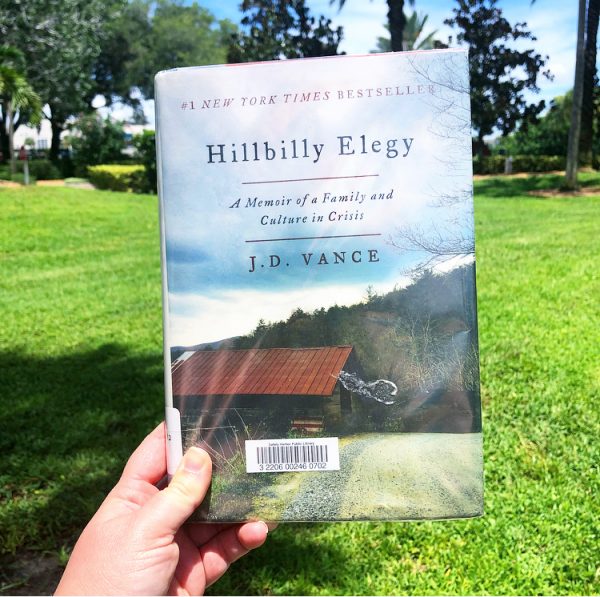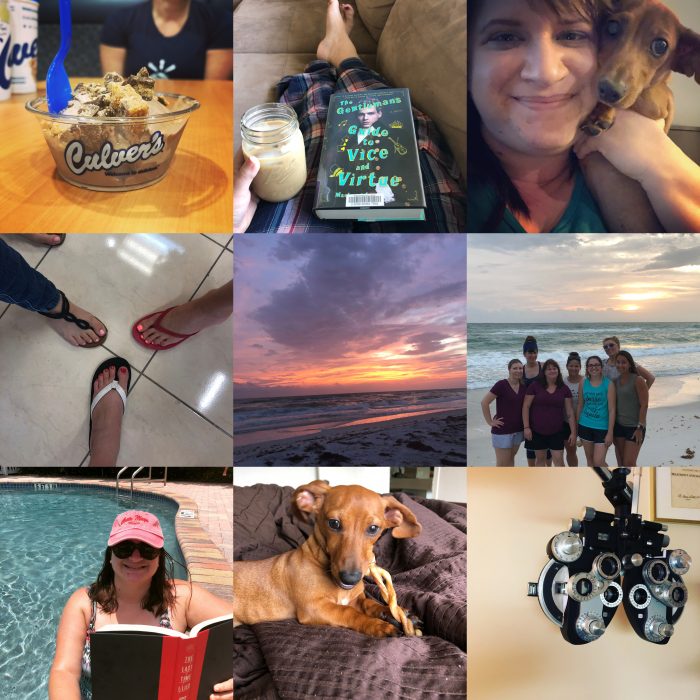I finished Hillbilly Elegy over the weekend, and it was a book I was prepared to dislike. I’d read a lot of reviews from people who read the book soon after the 2016 election and were disappointed that the book didn’t offer a real answer to the results of that election. Or that they were expecting more of a social commentary on the state of working-class Middle America.
But that’s not what Hillbilly Elegy is about. Instead, it’s a memoir. It’s one person’s experience growing up poor in Middle America, and escaping that life to become Ivy League educated and living comfortably in the middle class.
And while I can’t say I agreed with everything J.D. Vance had to say, especially when it comes to his politics, there was a whole lot I could relate to. Because you see, J.D. and I had very similar upbringings.
Like him, I grew up poor. My father was in and out of jail my entire life, due to his drug addiction, anger problems, and gambling addiction. She tried her best to give my brother and me a good life. She never had a bad word to say against my father, even when he was skipping out on child support and leaving threatening messages on our answering machine.
It was because of my father that we were poor. With his contribution, we could have done fine as a family. Maybe not at a level where we were going on lavish vacations or had a college savings fund, but our bills would have been paid and we wouldn’t have been evicted from multiple apartments. But instead, my father chose to gamble away his paycheck. And when that was gone, he’d pawn off our belongings (including my mom’s wedding ring, which he then blamed her for losing) or force my mom to give him part of her paycheck.
In Hillbilly Elegy, J.D. has a different experience as he had a revolving door of stepfathers and a mother who had a drug problem. His only saving grace was his grandparents, who made sure he attended school, studied hard, and made something of himself. It was because of them that he was able to escape the cycle of poverty and abuse, just like it was my mom who made sure I did the same.
She left my father because she didn’t want me growing up thinking the way my father treated her was the way men treat women. She didn’t want me to think that it was okay for a man to yell at you, demean you, call you names. She wanted more for me. And, because of that, I want more for myself when it comes to my relationships and I’m not settling until I get it.
In the book, J.D. talks about a concept called Adverse Childhood Experiences, or ACEs. He writes: “ACEs are traumatic childhood events, and their consequences reach far into adulthood … Children with multiple ACEs are more likely to struggle with anxiety and depression, to suffer from heart disease and obesity, and to contract certain types of cancers. They’re also more likely to underperform in school and suffer from relationship instability as adults. Even excessive shouting can damage a kid’s sense of security and contribute to mental health and behavioral issues down the road.”
J.D. and his sister Lindsay scored a six on their ACEs test. J.D.’s aunt scored a seven. Those without traumatic childhoods often score a zero, as is the case of J.D.’s aunt’s husband, who grew up in a normal home environment. I took the test myself. It’s 10 questions and you just answer yes or no to the questions. My ACE score was a six.
It wasn’t totally surprising to see that number staring back at me after I took the test. I knew my childhood was a rough one. There was domestic abuse, screaming matches, times when I curled into a ball under my bed with a pillow over my ears to drown out the fighting. There was a father who never gave me the love and attention I desperately craved. There was divorce and food stamps and never feeling like there was enough money. There was depression and insomnia and anxiety. That was my childhood.
It reverberates to this day, as I still get uncomfortable if my mom hassles my stepdad about something. My stepdad has never once raised his voice or his hand to my mom (or to anyone, I’m sure) and has the most low-key disposition of anyone I know, and I’m still worried that one wrong word from my mom, and he’s about to go off on her.
It’s also why I just find it easier not to date because I’m just too worried about becoming the woman my mom never wanted me to be. The woman who acquiesces to her husband’s demands and doesn’t let her opinion known. I’ve seen myself doing that in relationships, and it manifested itself greatly in the only successful relationship I’ve ever had. I let him walk right the fuck over me, saying yes to things I wasn’t comfortable with and giving up all of my free time to be with him because that’s what he wanted. Never mind what I wanted. Never mind that we never did what I wanted to do. (Which isn’t totally on him – it’s also on me for not feeling like I could voice my opinion. Because if I did, I would lose him. And I desperately didn’t want to lose him.)
And that brings me to this quote from the book, which resonated with me greatly: “For kids like me, the part of the brain that deals with stress and conflict is always activated – the switch flipped indefinitely. We are constantly ready to fight or flee … We become hardwired for conflict. And that wiring remains, even when there’s no more conflict to be had.”
I’m a very non-confrontational person, and I am this way because I’m constantly worried that the people I love are going to leave me. It’s hard for me to express a dissenting opinion because I don’t want someone to realize that this is the reason we should not be friends anymore. I’ve spent my whole life making sure everyone around me is happy and satisfied, that their needs are always being met. Because what my childhood taught me is that conflict is always on the horizon. One wrong word to my dad, one small slip-up, and he was enraged and all of his anger was taken out on me. So, it makes sense that I just eliminate conflict altogether, hence the way I’ve acted in my romantic relationships. But in doing so, I’ve forgotten that my needs also matter. That it’s okay to have a different opinion. That the beauty of a relationship isn’t everyone loving the same things in the same way, but us coming together with different opinions, likes, and dislikes. It’s a daily battle of recognizing that conflict isn’t always bad and that it doesn’t always cause people to jump off the deep end into anger.
When I think about my childhood, my ACE score, and the way the deck was completely stacked against me, I can’t help but feel so damn proud of myself. Sure, I’ve got some stuff to work out and it’s why I’m seeking therapy so that I can learn how to get past my childhood trauma and actually be able to function in a healthy relationship, but all in all, I’m not doing half bad. I have a great, steady, well-paying job. I have my own apartment. I am financially independent. I took care of a dog in the last years of his life and did a damn good job at it. I have friends and an active social life. I have a brother who has stuck by my side throughout everything and even stood up for me to my father time and again. He’s shown me what a true man looks like.
And I have my mom. Every kid with a traumatic childhood has to have someone watching out for them, and I am so grateful that she was that person for me. She got us out of a volatile home environment and into one filled with love and happiness and hope. She dated one man from the time she left my father to the time she started online dating in my mid-twenties – because to her, it was important that she gave her full attention to us and kept us happy and healthy. (But, boy, sometimes I wish she had met Robert much earlier!) My childhood wasn’t ideal, that’s for sure, but I got through it, and I got through it because of my mom’s deep love and persistent expectations for me.




